How to Get a Google Knowledge Panel
Topic: SEO
Published:
Written by: Bernard Huang
Getting in front of your target audience is vital. Whether you’re building your personal brand or working on your business, you need attention and growth from your engaged user base. But figuring out how to get those views can be tricky.
A trend that’s causing some website developers to rethink their SEO strategies is a wave of searches with no clicks to any website.
Semrush studied over 600,000 searches in 2022 and found 25.6% of desktop and 17.3% of mobile searches were part of this “zero-click” trend. That means users didn’t click on any links — organic or paid. So now the information displayed on the SERPs is even more important than just driving links. It may be your only contact with the searcher.
But why wouldn’t users click on anything?
Most likely they got the information they wanted without leaving the first search engine results page (SERP) from the summaries with the results. But more so, many of these searchers probably found what they were looking for in a Google knowledge panel.
But what is a knowledge panel? Why would you want one? Where does the information come from? And how do you get your own Google knowledge panel?
What is a Google knowledge panel?
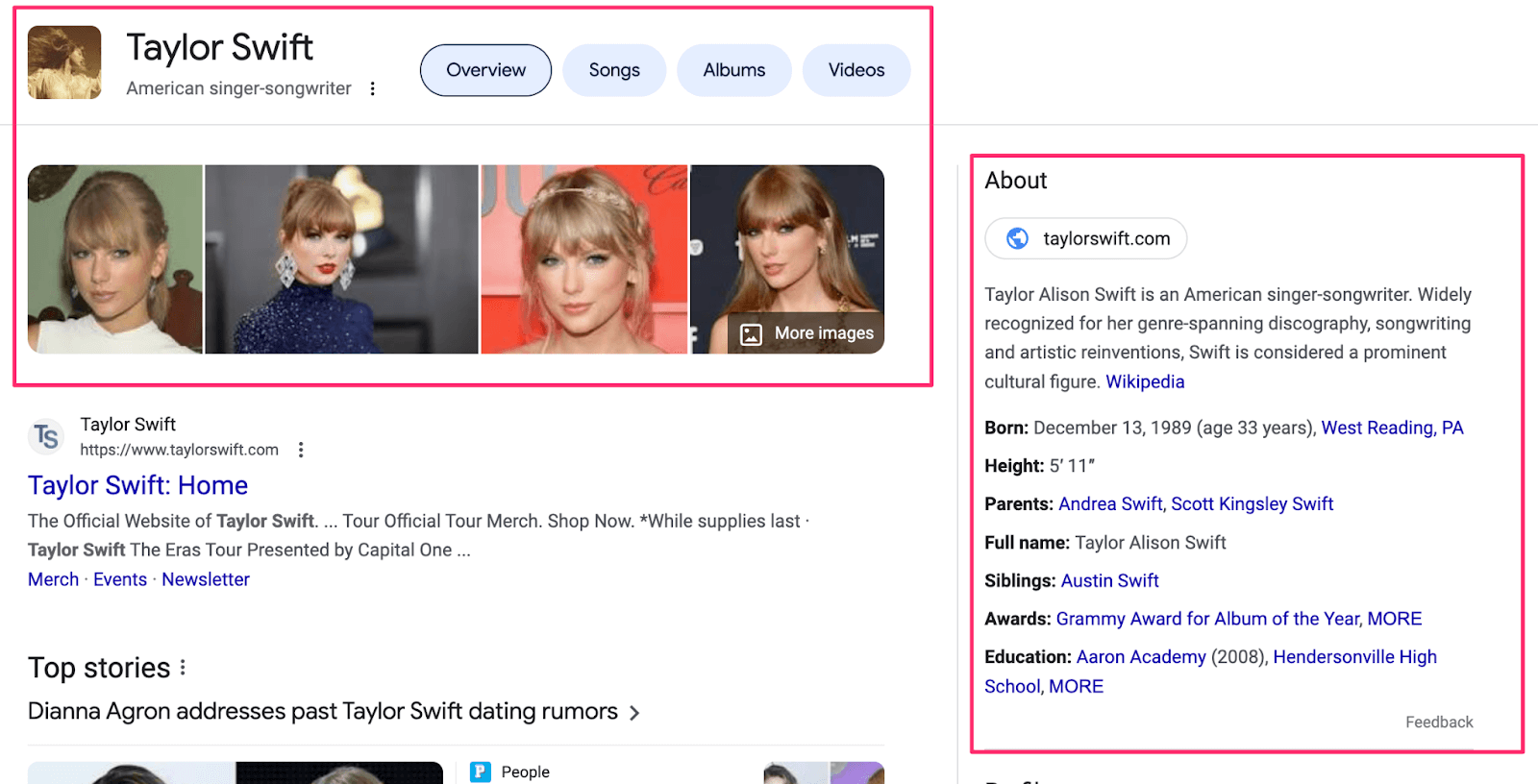
Taylor Swift’s Google knowledge panel.
A Google knowledge panel is a highlighted segment on the SERP that shows a short answer to common questions about a person, place, or thing — or as Google calls them, “entities.”
The information in a knowledge panel is usually basic facts. You’ll find some key dates (like the date of birth or the date a business was founded) and a short description of the entity. It’s similar to what you might find in an encyclopedia.
Google launched knowledge panels for desktop in 2012 and has continued to make changes and updates to them — like adding the feature to mobile.
Knowledge panels generally have a standard format for some topics like artists or authors. For example, with musicians, you’ll find information such as songs they’ve released, when their albums came out, and a basic biography. You’ll also sometimes see links to their social media profiles and company website.
Similarly, for businesses, the knowledge panel usually includes the industry, phone numbers, and location.
Google knowledge panel information is usually sourced from Google’s Knowledge Graph.
Google Knowledge Graph
Google knowledge panels get information from the Google Knowledge Graph, a huge database of easily searchable (for a bot) data about entities. As of 2020, Google claims its Knowledge Graph had over 500 billion facts about five billion entities.
The information in this database comes from multiple sources, most notably Wikipedia. Because of this bias, the Knowledge Graph isn’t completely impartial. In fact, Google has repeated errors and presented opinions as facts at times.
For example, in June 2021, a screenshot of a knowledge panel calling Kannada the “ugliest language in India” went viral on Twitter. Google removed the result and apologized for the mishap.
The Knowledge Graph was criticized in the past for not providing sources for data and has since added source information or a link to the original source for most entries.
Despite its issues, the Knowledge Graph is useful because it helps give context to searches. For example, if you search for “famous pop singers,” you’ll find knowledge panel entries for artists such as Ariana Grande and Whitney Houston.
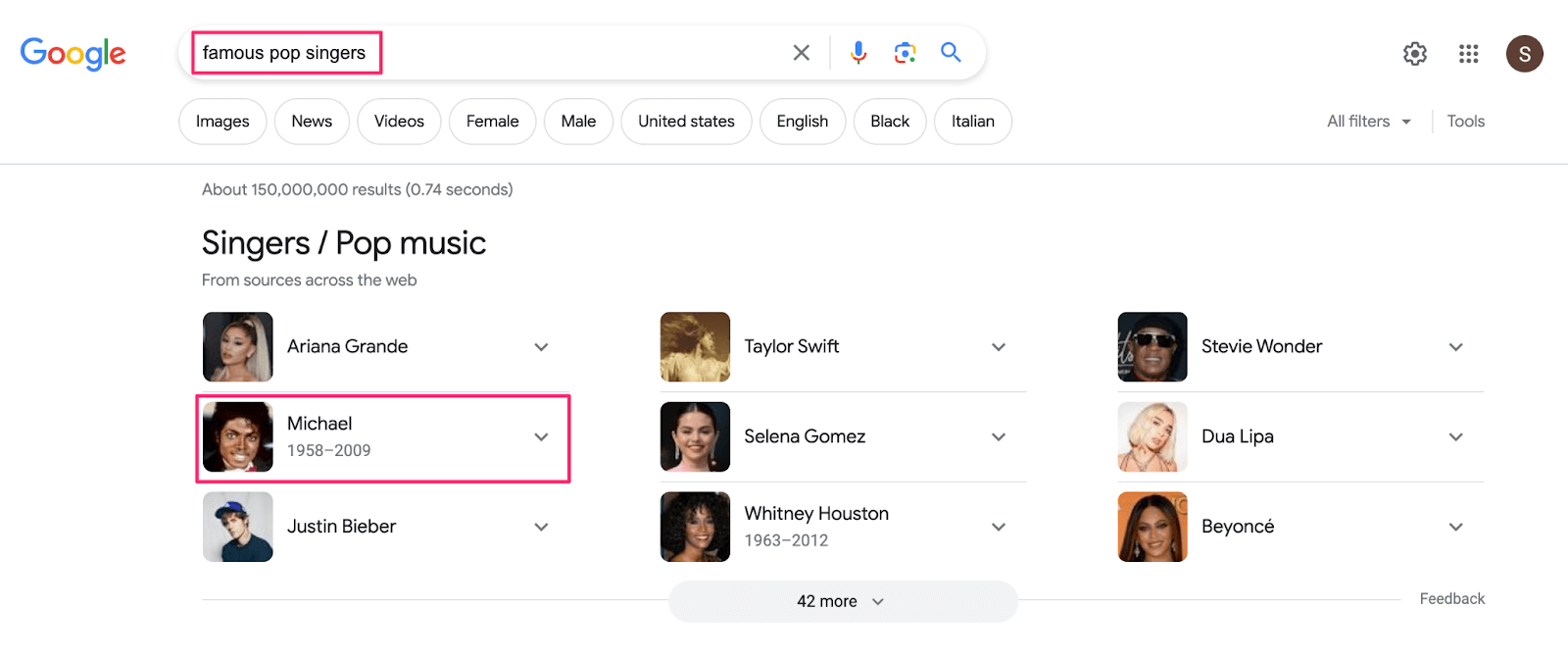
Google’s search result for “famous pop singers".
If you click one of the entries — for example, Michael Jackson— you’ll see relevant information about the artist, such as his dates of birth and death and accomplishments.
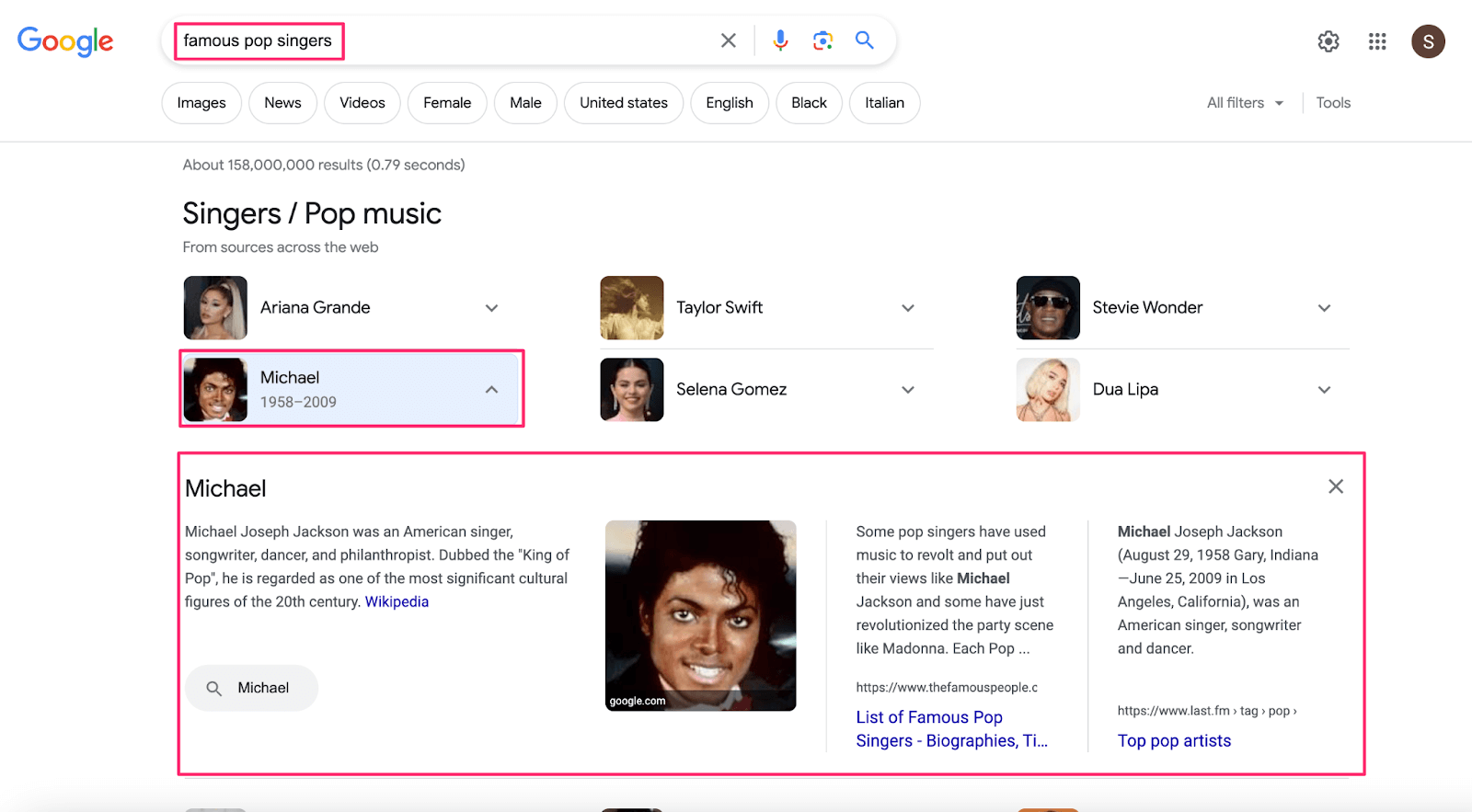
If you click Michael Jackson’s knowledge panel entry, you’ll see facts about the artist.
The Knowledge Graph can connect your search terms to other information and provide the most likely answers based on what you entered. The Knowledge Graph’s algorithm connects information based on multiple sources and with more context than a simple search.
Now that we’ve gone over what knowledge panels and the Knowledge Graph are, you might be wondering how to get a Google knowledge panel of your own — and why you’d want to.
Why should I get a Google knowledge panel?
A big reason to aim for a knowledge panel is where you can find them on SERPs. Knowledge panels always feature prominently in search — they’re usually either above the first organic result or on the top right side of the result screen.
If your website is the source for a knowledge panel, you’re going to be one of the first results a searcher finds.
But with zero-click searches growing in popularity, especially for simple fact-finding, how does that affect the need for a Google knowledge panel?
A knowledge panel helps your visibility and delivers more information about you (or your business) to a searcher without the need for a click-through.
A 2020 study by Engine Scout found that SERPs with both featured snippets and knowledge panels received 42.1% of all clicks — more than regular organic results (32.3%). So while clicks might be down, you’re more likely to get traffic if you have a knowledge panel.
Try to also optimize for featured snippet opportunities related to yourself or your business to further increase visibility. Once you have your own knowledge panel, there’s a chance it will show up alongside the featured snippet.
These featured results show authoritativeness and are usually easier for users to read, as they feature bold type and more white space. That, combined with their prominent location and higher traffic, means you probably want to have a knowledge panel for yourself.
Is it hard to get a Google knowledge panel?
Figuring out how to get a Google knowledge panel will depend on your individual circumstances. For example, it will likely be easier for someone considered authoritative in their industry to get a knowledge panel than someone lesser known.
In general, knowledge panels are reserved for facts about entities. Google has two main categories of knowledge panels — branded or personal knowledge panels and local knowledge panels.
Branded knowledge panel
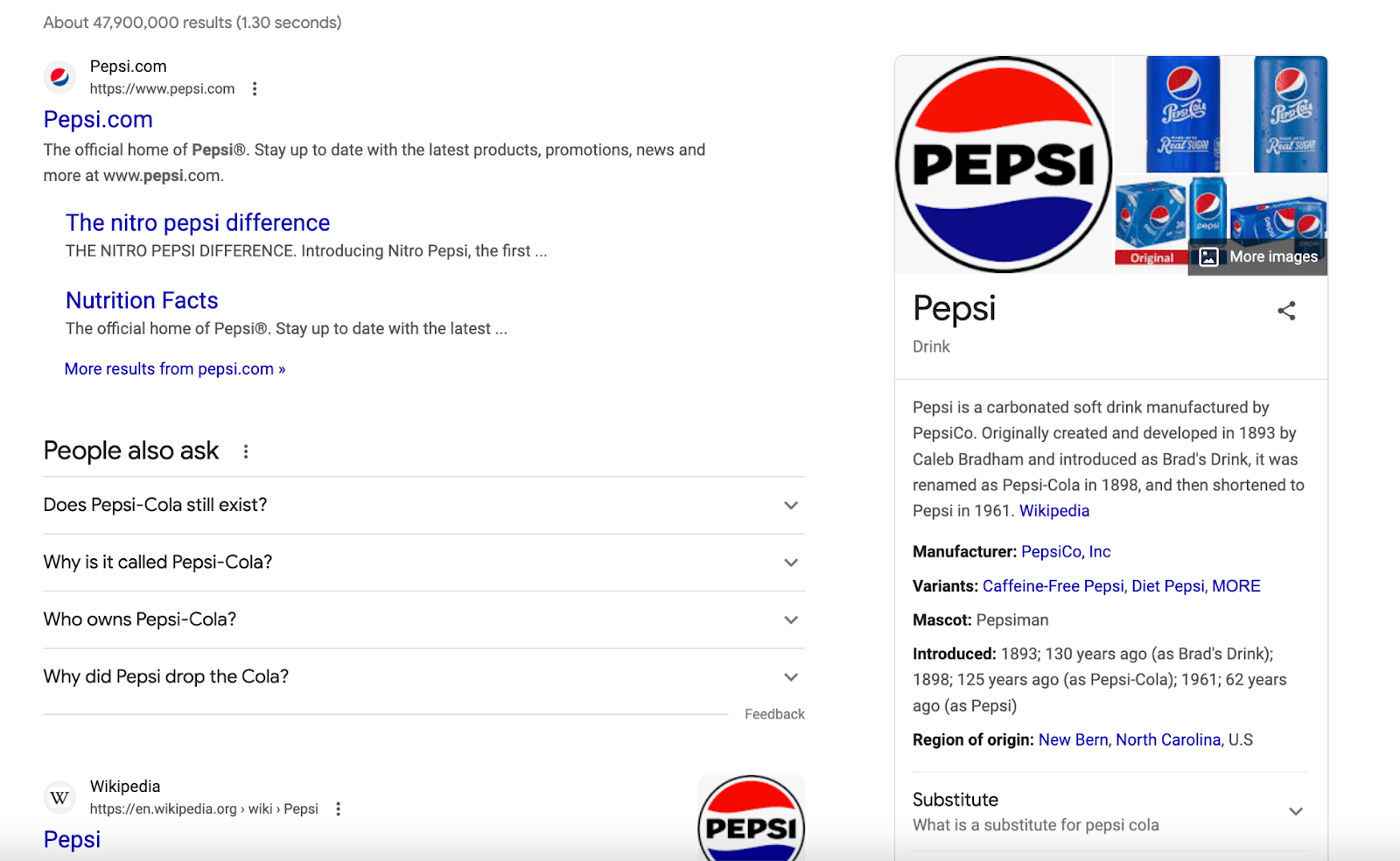
Branded knowledge panels are about well-known or prominent businesses, people, things, and places.
Branded knowledge panels are about prominent entities. These include celebrities and anyone else Google deems relevant, like well-known business leaders and scientists.
It’s important to note not every company will have a branded knowledge panel, and you can’t pay to get one.
Instead, businesses are usually in more of a middle ground. While some companies may naturally acquire a local or branded knowledge panel, many others need to set up a Google Business Profile (formerly Google My Business) page instead.
Local knowledge panel
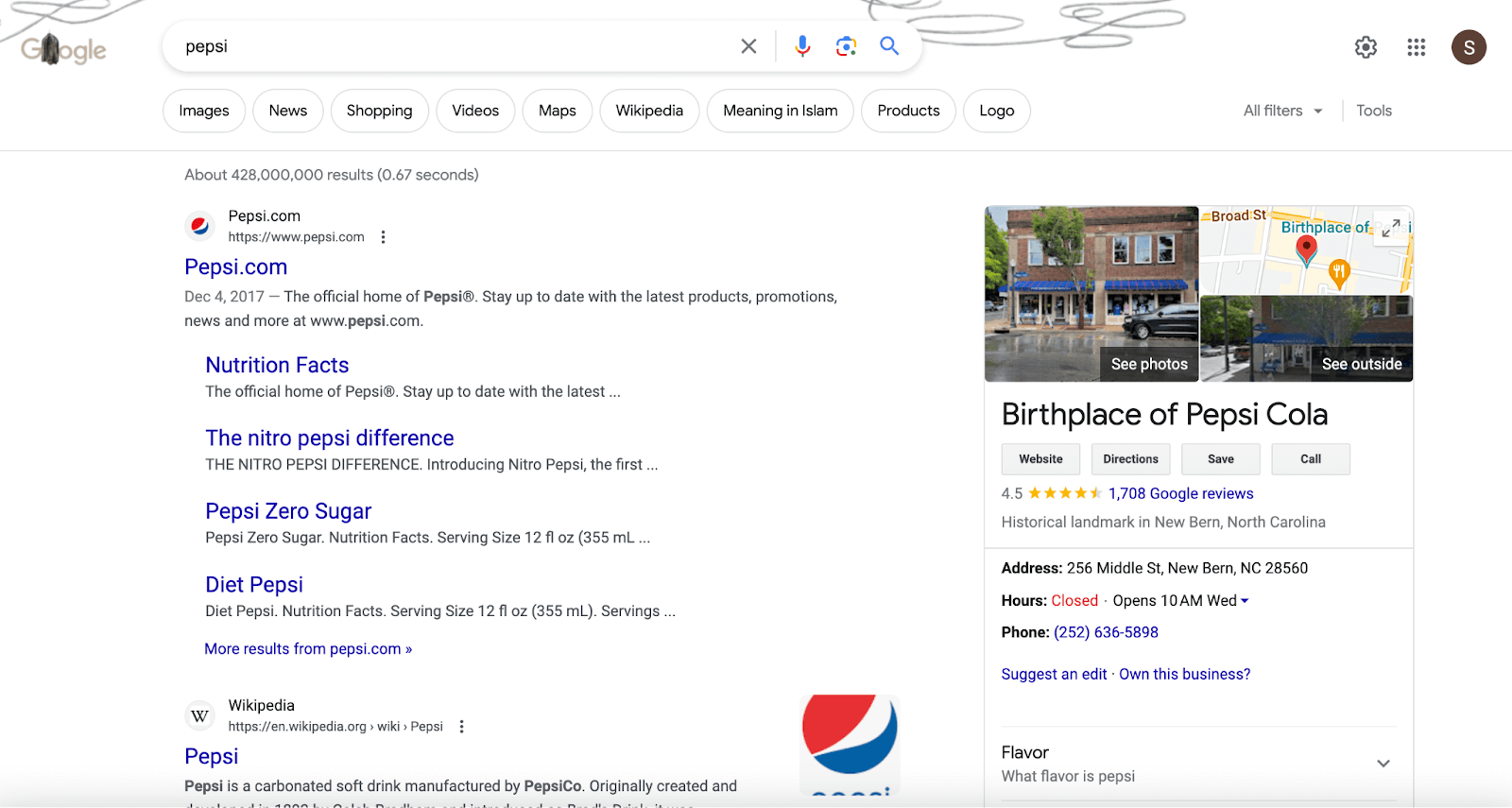
A local knowledge panel shows relevant search results based on your location.
Local knowledge panels are customized based on your location. They’re most commonly used for prominent local businesses and historical sites.
If you do a Google search for “Pepsi” in most of the world, you’ll probably see the company’s branded knowledge panel pop up. But if you search for “Pepsi” while in North Carolina, you’ll see the brand’s local knowledge panel instead, which shows the historical building where the soft drink was invented.
Local knowledge panels will also show unique results for some nationwide chains and local businesses, and you’ll often see a panel with the closest location to you.
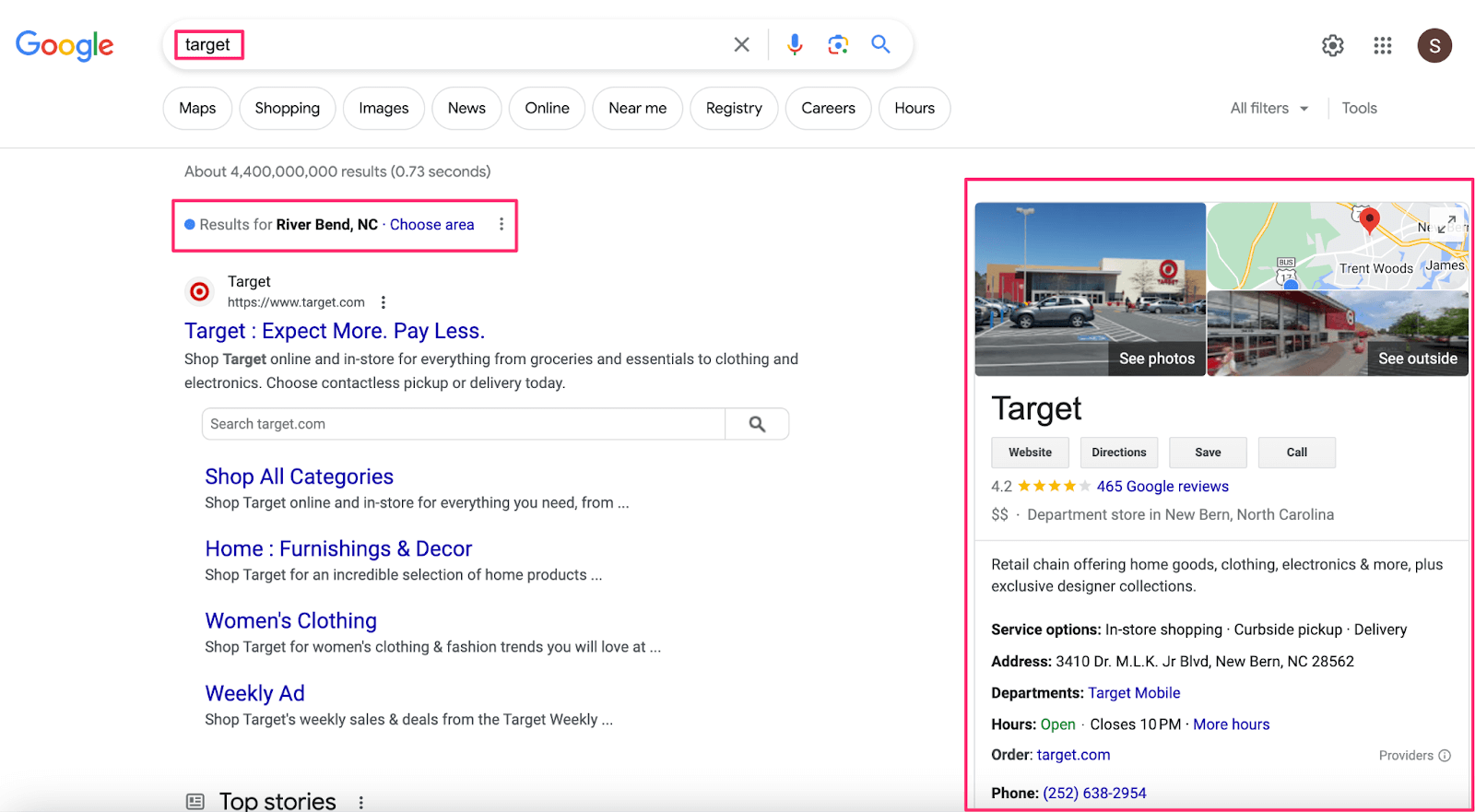
A local knowledge panel for Target with the store’s closest location to the user.
In the example above, on the right side of the screen, you’ll see a search for “Target” which shows the store that’s closest to the user. Google also notes the results are personalized based on location.
Creating your own knowledge panel
Google says knowledge panels are automatically generated.
However, most of this information comes from the Knowledge Graph, which sources info from Wikidata that can be edited.
It can take a lot of work to get a knowledge panel automatically. So if you don’t already have a Google Business Profile, you should set one up.
Google lets any business, regardless of size, register a business profile. You can fill out the information so your logo, hours, and other business details are up to date.
In addition to creating a business profile, you can improve your chances of getting into the Knowledge Graph by adding structured data to your website. We’ll go into more detail about this further down.
Lastly, it’s possible that AI could play a role in knowledge panels soon too. Google rolled out Bard (now Gemini) in early 2023 and plans to use the AI-powered tool to answer complex questions in “easy-to-digest formats.” The tool will also probably impact search going forward — especially since Gemini can use the Google Knowledge Graph.
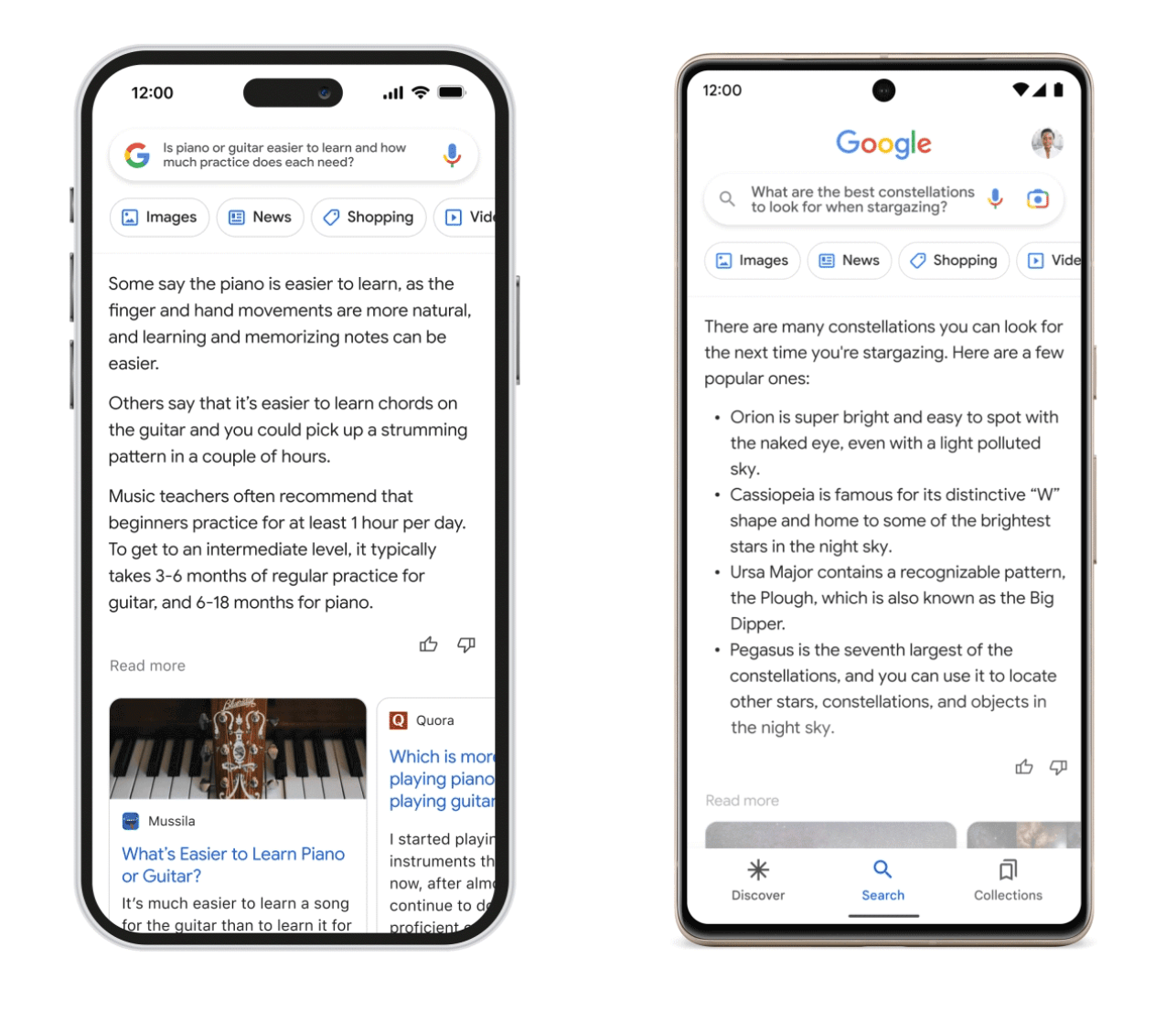
An early example of Google’s proposed Bard AI—now Google Gemini—tool (image source).
With that in mind, here are some tips on how to get your own Google knowledge panel.
How to get a Google knowledge panel
Google yourself
Get into Google’s Knowledge Graph
Build up a network of secondary sources
Create a Google Business Profile
Make or update your About page
Add structured data
Build authoritative links to your website
1. Google yourself
First, you need to Google yourself to see where you stand. Do you already have an existing (but possibly inaccurate or outdated) knowledge panel? If so, you’ll want to click the Claim this knowledge panel button.
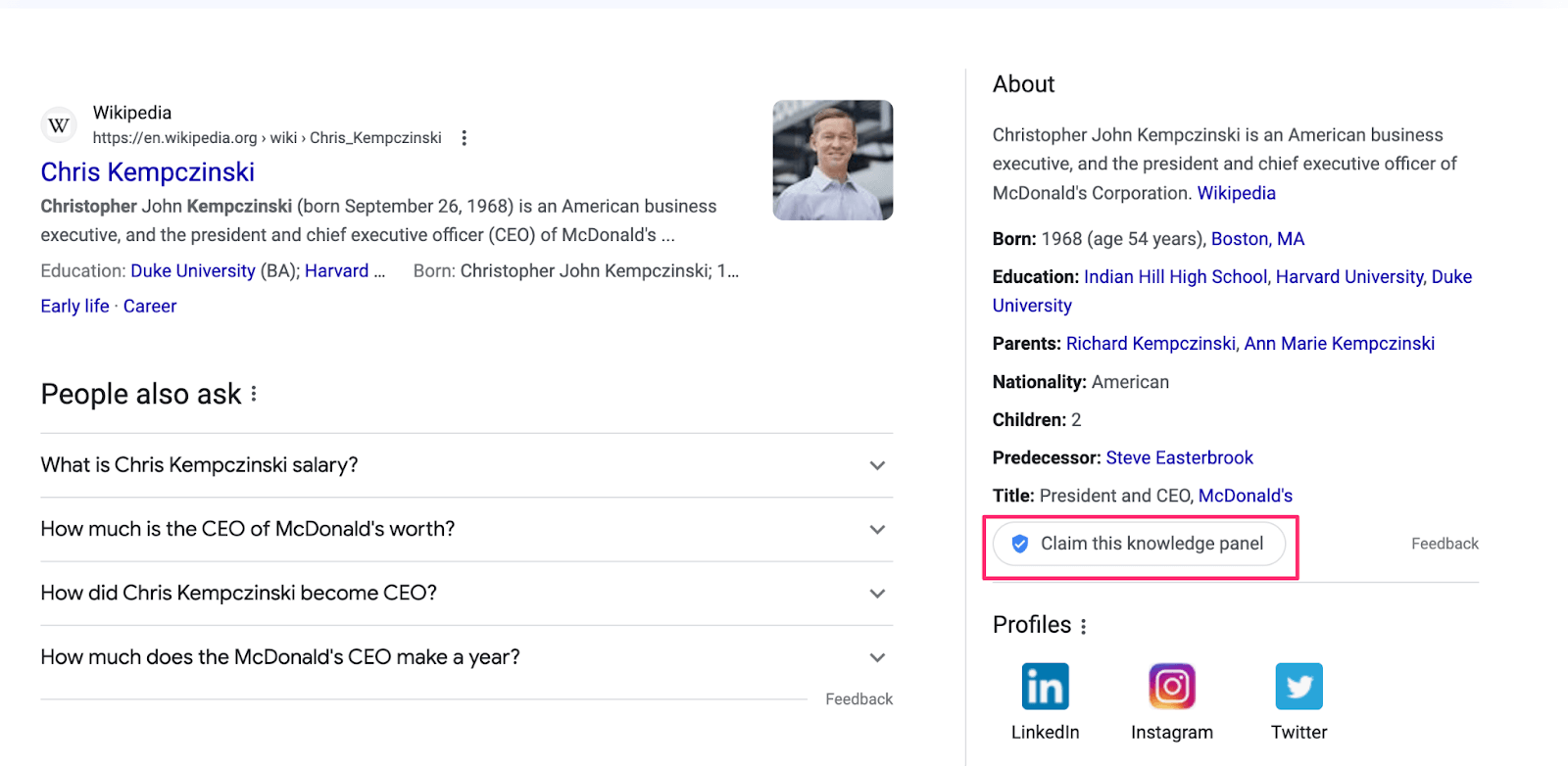
Click “Claim this knowledge panel” to make edits to your own panel.
Follow the prompts Google sets out to verify your identity or brand name. After that, you’ll be able to make information changes about yourself or your business.
2. Get into Google’s Knowledge Graph
If you don’t have an existing knowledge panel, then you need to get into Google’s Knowledge Graph.
To do this, make sure that Google can find a lot of external information about you. You want any given search query about you to show information from multiple sources, not just your own website.
Should you make your own Wikipedia page?
While Google sources much of its Knowledge Graph information from Wikipedia, you probably shouldn’t try to make a Wikipedia page about yourself. This goes against Wikipedia’s guidelines, and your page will probably be removed if it lacks alternative sources or multiple editors.
You also shouldn’t make a Wikipedia article if you don’t have many secondary sources about yourself, either. One of the main requirements for pages is that the entity has notability, so focus on that first.
3. Build up a network of secondary sources
To work on your notability, start building a network of secondary sources and outside coverage. This could be from sources such as local newspapers, professional articles, or podcasts. Note that this doesn’t include press releases, as those are self-published.
You will need a significant amount of coverage. Wikipedia doesn’t weigh all sources the same, so one reference in a national newspaper may be enough. But several articles and local TV appearances might not be considered acceptable in other situations.
Some ways to get secondary sources include:
Being featured in articles from reputable publishers
Being featured on a podcast
Reaching out to reporters
Featuring in local news
These additional sources will also help in building links, which communicate the relationship between webpages.
4. Create a Google Business Profile
As mentioned before, create your Google Business Profile if you don’t already have one. Be sure to update it regularly — add fresh images, update your business hours, and make sure everything is accurate.
After you’re verified, it only takes a few minutes to add your information.
5. Make or update your About page
An About page on your website serves a lot of purposes. This page should explain who you and your business are, what you do, and highlight important facts about yourself.
Your About page also serves as the “entity home” to add structured data specifically for the knowledge panel.
6. Add structured data
Next, you want to add structured data — like that from schema.org — to mark up your website and optimize it for a knowledge panel. You’ll add different schema markups depending on if you’re describing an organization, brand, or person, so be sure to look over what type of schema markup you need to add to your website.
To add structured data, you can use plugins if you use WordPress. You can also add it by editing the code in your website’s theme files if you know or want to learn how to use schema.
7. Build authoritative links to your website
Link building not only helps with domain authority and traffic, but it also provides context to search engines. Links also help search engines understand the connection between webpages and your brand.
Backlinks also help establish trust. It signals to search engines that others trust you or your brand, so they are willing to link to you.
While it’s difficult to directly control these information boxes, you can improve your chances of getting a knowledge panel with useful, user-focused content. Clearscope, an SEO content optimization tool, can help.
Can I have a Google knowledge panel without a website?
It’s possible, but not likely.
Google knowledge panels work by providing users with a useful summary of information, along with links to find out more. While historical events or people wouldn’t necessarily have their own website, most modern knowledge panel subjects do.
The main exception seems to be influencers with a significant social media presence, like a prominent TikTok account or YouTube channel, or famous people who prefer not to be in the limelight.
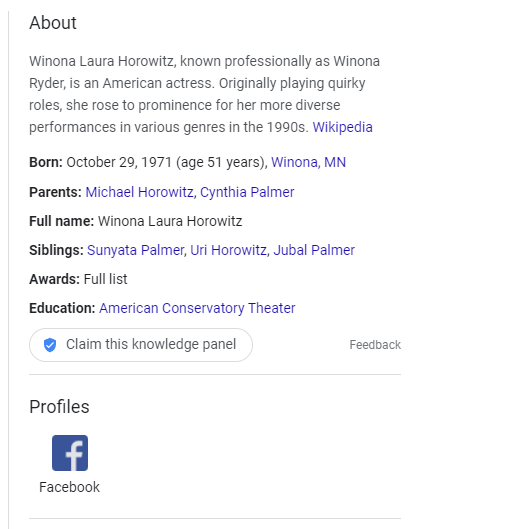
Screenshot
Above is an example of actress Winona Ryder’s knowledge panel. Note that she’s made it a point to keep off of social media and doesn’t maintain a website. Her knowledge panel directs to the only verified social media account she has.
Knowledge panels often list social media profiles — usually at the bottom of the panel — so stay active on them if your website isn’t a priority. Regularly update your social profiles with relevant content that features consistent branding. You can repurpose some of this material to help build up an audience and become more recognized in your niche.
Final thoughts: How to get a Google knowledge panel
A Google knowledge panel is one of the harder SERP features to optimize for.
But knowing how to get a Google knowledge panel is half the battle. Your existing content strategy will probably overlap with your efforts to acquire a knowledge panel, likely through a combination of brand consistency, structured data, your Google Business Profile, and gaining additional coverage from secondary sources.
Coming up with great SEO content is the rest.
From social media presence to link-worthy articles, the more optimized your own website is, the more likely you’ll land a knowledge panel.
How to Improve Your Google Rank: 2023 Best Practices Guide
Our post reviews five best practices to improve your Google rank — from performing technical audits to optimizing page content & promoting brand awareness.
Read moreHow Long Does It Take to Rank In Google With SEO Techniques?
How long does it take to rank in Google? Using SEO techniques, it can take 3-6 months to rank an article depending on the competition for your keyword.
Read moreHow To Get Good Backlinks: A Step-by-Step Guide
Learn what high-quality backlinks are, why they’re so important, and how to get good backlinks for your website with our step-by-step guide.
Read more